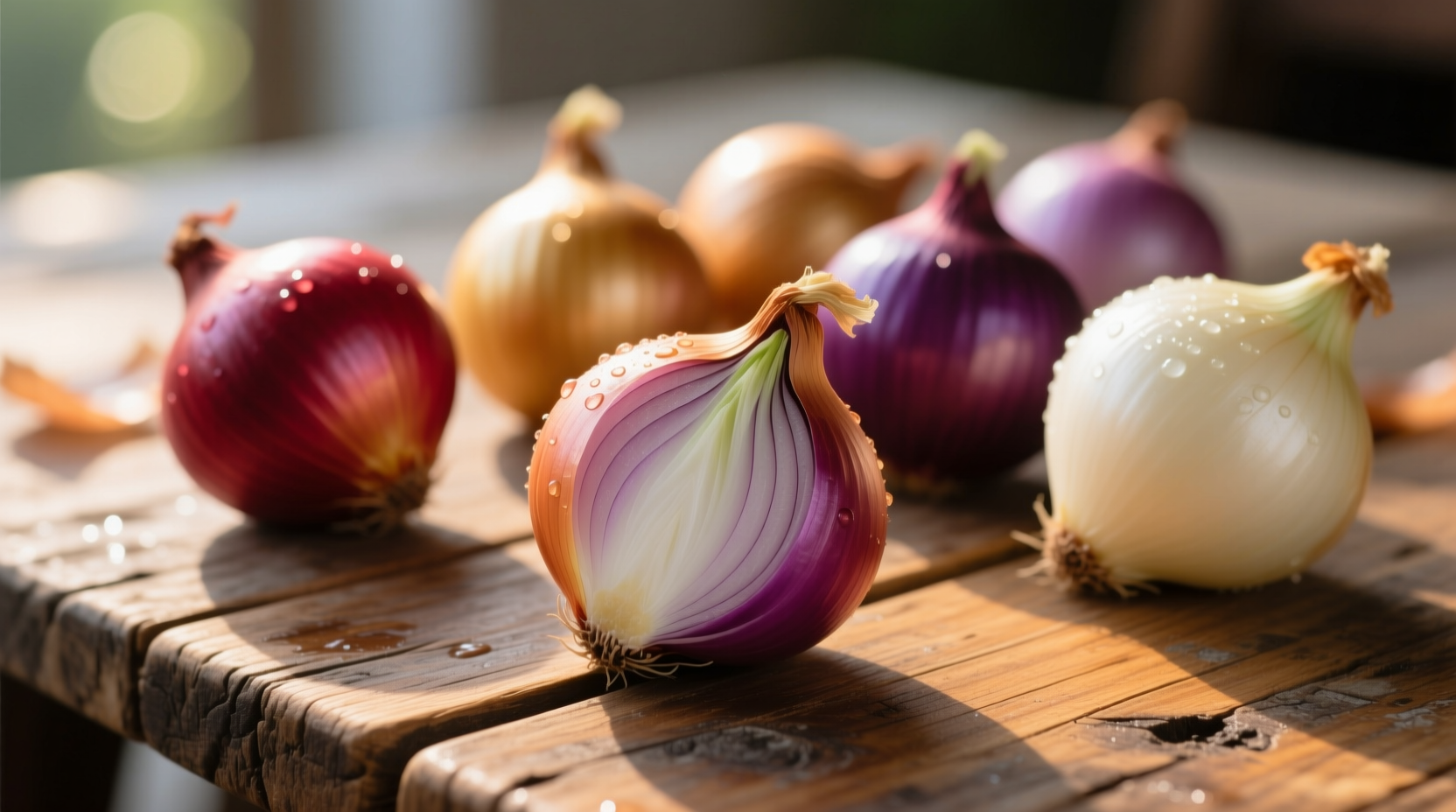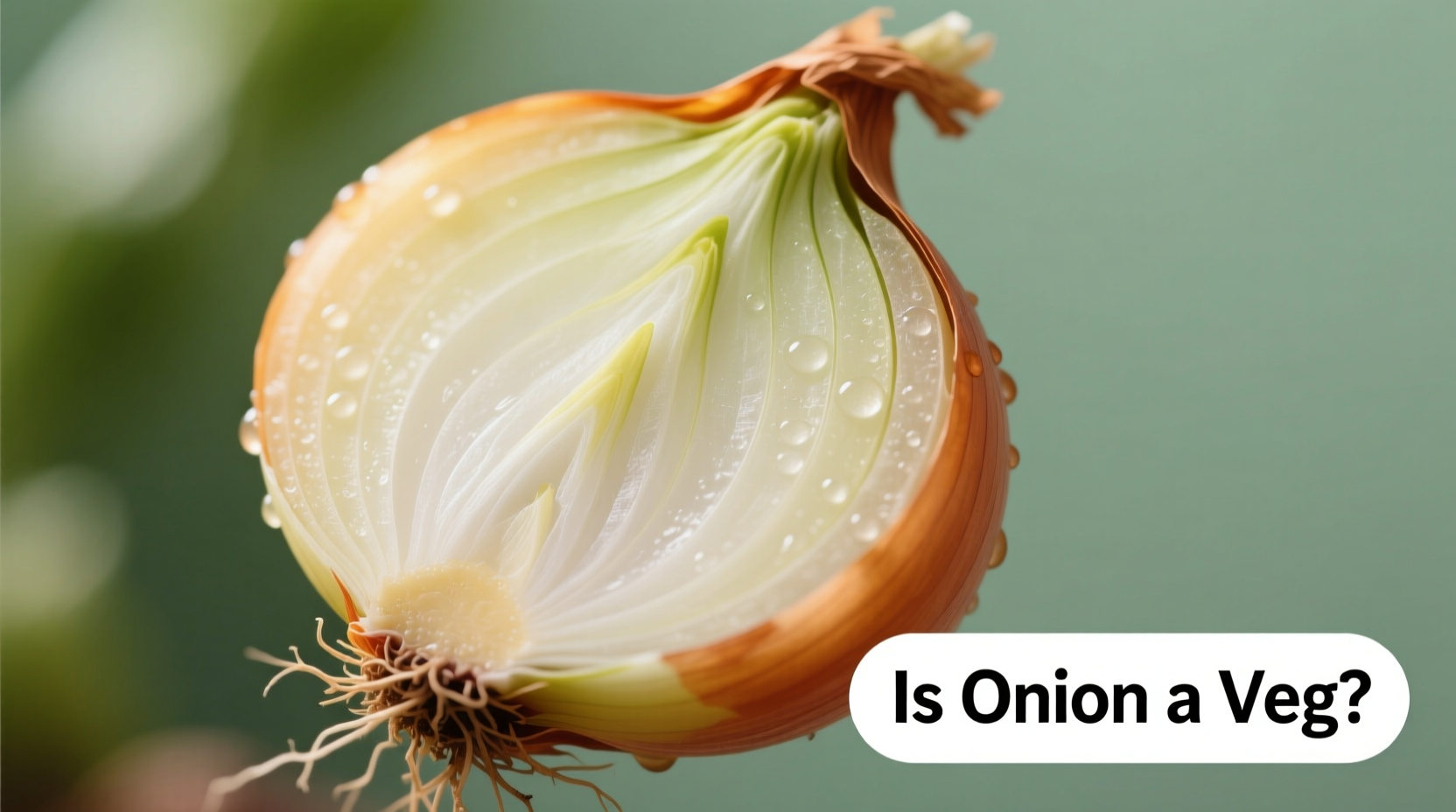Yes, onions are classified as vegetables in culinary and nutritional contexts, despite being botanically classified as modified stems (bulbs). This dual classification explains why confusion exists about whether onions qualify as vegetables.
When you're cooking dinner or planning a balanced meal, understanding whether is onion a veg matters for recipe accuracy and nutritional planning. The straightforward answer is yes—onions are vegetables in everyday usage, even though botanists categorize them differently. Let's clarify this common point of confusion once and for all.
Why Onions Qualify as Vegetables in Practical Terms
While botanists classify onions as modified stems (specifically bulbs), culinary professionals, nutritionists, and government agencies universally treat onions as vegetables. The USDA's FoodData Central database categorizes onions under the vegetable group, and major culinary institutions like the Culinary Institute of America include onions in their vegetable curriculum.
This distinction exists because culinary classification focuses on how we use ingredients in cooking, while botanical classification concerns plant biology. When answering is onion a veg for practical kitchen purposes, the culinary perspective matters most.
Botanical vs. Culinary Classification Explained
Understanding why onions create classification confusion requires examining both perspectives:
| Classification Type | Onion Category | Key Characteristics |
|---|---|---|
| Botanical | Modified Stem (Bulb) | Storage organ made of layered leaf bases surrounding a short stem |
| Culinary | Vegetable | Used as savory ingredient, not sweet like fruits; no seeds consumed |
| Nutritional | Non-Starchy Vegetable | Low in calories, carbohydrates, and fat; rich in vitamins and antioxidants |
This onion vegetable classification comparison shows why context matters when determining whether onions qualify as vegetables. In your kitchen and on your plate, onions function as vegetables—providing flavor, texture, and nutrients without the sweetness characteristic of fruits.
Historical Context: How Onions Became Culinary Vegetables
Understanding the historical evolution of onion classification helps explain today's culinary consensus. Here's a brief timeline of how onions transitioned from botanical curiosity to kitchen staple:
- 5000 BCE: Earliest evidence of onion cultivation in ancient Egypt, where they were valued as food and medicine
- 1st Century CE: Roman agricultural writer Columella classified onions as oleracea (vegetables for cooking) in De Re Rustica
- 1753: Carl Linnaeus established modern botanical classification, identifying onions as Allium cepa (bulb-forming plant)
- 19th Century: Culinary texts like Mrs. Beeton's Book of Household Management listed onions among essential vegetables
- 1940s: USDA begins formally categorizing onions as vegetables in nutritional guidelines
This historical progression demonstrates how practical kitchen usage has consistently treated onions as vegetables, regardless of botanical technicalities. When exploring why are onions considered vegetables, this historical context proves essential.

When Classification Actually Matters
For most home cooks and nutrition planners, the botanical classification of onions doesn't affect daily decisions. However, understanding this distinction becomes important in specific contexts:
- Gardening: Knowing onions are bulbs (not roots) affects planting depth and crop rotation
- Allergen labeling: Botanical classification matters for food safety regulations
- Nutritional planning: Onions count toward daily vegetable intake recommendations
- Culinary competitions: Some professional cooking contests have specific vegetable category requirements
For everyday cooking and meal planning, the simple answer to is onion a vegetable or fruit remains straightforward: onions function as vegetables in culinary applications. This practical perspective aligns with how major food authorities categorize them.
Common Misconceptions About Onion Classification
Several persistent myths confuse people when determining whether onions qualify as vegetables. Let's clarify these misconceptions with evidence-based information:
- Myth: "Onions are roots because they grow underground"
- Fact: Onions are bulbs—modified stems that store nutrients, not true roots like carrots
- Myth: "Vegetables must be roots, stems, or leaves"
- Fact: Culinary vegetables include flowers (broccoli), seeds (peas), and bulbs (onions)
- Myth: "If it's not a fruit, it must be a vegetable"
- Fact: Botanically, many "vegetables" are fruits (tomatoes, cucumbers), while others like onions are neither
These clarifications help resolve the confusion behind onion vegetable classification explained. The key takeaway remains that for nutritional and culinary purposes, onions function as vegetables regardless of botanical technicalities.
Practical Implications for Your Kitchen
Understanding that onions qualify as vegetables affects several practical aspects of cooking and nutrition:
- Nutritional tracking: Count onions toward your daily vegetable intake (1 medium onion = 1 cup of vegetables)
- Recipe substitution: Replace onions with other allium vegetables like shallots or leeks when needed
- Cooking techniques: Apply vegetable-specific methods like sautéing, roasting, or caramelizing
- Meal planning: Include onions as part of your vegetable rotation for dietary diversity
When following dietary guidelines like MyPlate, onions count as vegetables—providing valuable nutrients including vitamin C, B vitamins, and antioxidants. This practical application matters far more than botanical technicalities for most home cooks.
Conclusion: The Simple Answer to a Complex Question
The question is onion a veg has a straightforward answer for practical purposes: yes. While botanists classify onions as bulbs (modified stems), culinary professionals, nutritionists, and government agencies consistently treat onions as vegetables. This classification affects how we use onions in cooking, count them toward nutritional goals, and understand their role in balanced diets.
When planning meals or following recipes, focus on onions' culinary function rather than botanical technicalities. Onions provide the savory depth, nutritional benefits, and cooking versatility we expect from vegetables—making them essential components of countless dishes worldwide.











 浙公网安备
33010002000092号
浙公网安备
33010002000092号 浙B2-20120091-4
浙B2-20120091-4